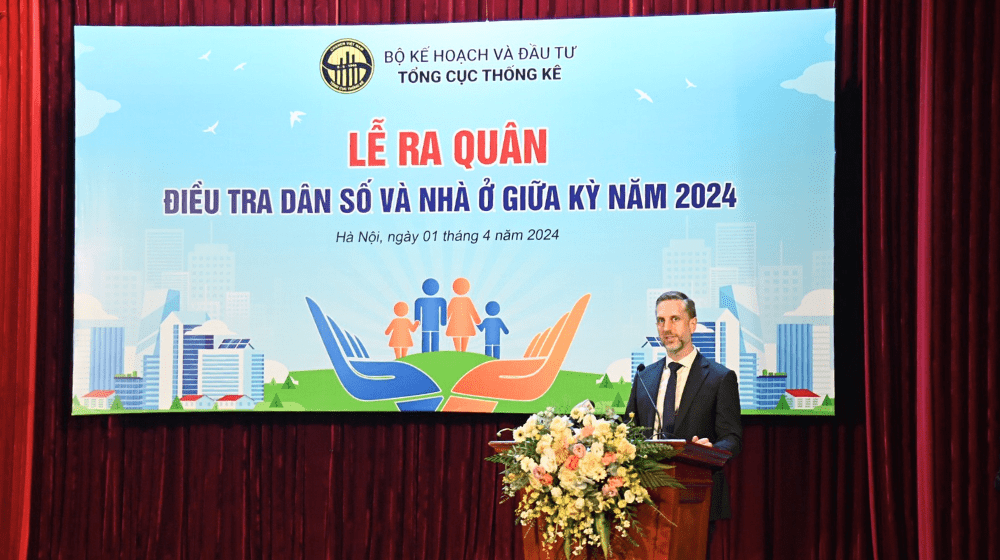- Madame Nguyen Thi Huong, Director General of the General Statistics Office;
- Mr. Nguyen Dinh Khuyen, Vice Secretary of the Party organisation and Chairperson of the People’s Committee of Tay Ho precinct;
- Distinguished guests
It’s my great honour to join Madam Nguyễn Thị Hương to launch the 2024 Intercensal Population and Housing Survey today. This is another important milestone in the statistics sector. The outcomes of the Survey will help inform the most important policy decisions to fast-track the implementation of the Sustainable Development Goals in Viet Nam.
I would like to take this opportunity to congratulate the General Statistics Office for its enhanced technical and organisational capacity to prepare for this large-scale survey and I wish you success in undertaking it. I hope that findings of the survey will be announced at the end of this year and as a result, at least 20 important SDG indicators will be updated on the road to 2030.
UNFPA Viet Nam is proud to have partnered with the General Statistics Office for nearly 50 years. Countries which have quality data are those which achieve impressive growth and in particular support the needs of their people. Better Data: Better Lives. In December 2023, I was pleased to partner with GSO and Director General Madame Huong to launch Viet Nam’s National Transfer Accounts – another excellent source of data for policymakers.
Significant progress has been made to develop national databases. For example, there is a national population database managed by the Ministry of Public Security; and the civil registration and vital statistics system managed by the Ministry of Justice. However, these databases are still in a pilot phase and further efforts are needed to improve the database infrastructure. That’s why this Intercensal Population and Housing Survey is one of several needed to collect data and evidence on Viet Nam’s socio-economic development progress.
Viet Nam is in the midst of rapid socio-economic growth. The Socio-economic Development Plan (SEDP) 2021-2025 and corresponding sector plans, as well as the National Plan of Action to achieve the Sustainable Development Goals (SDGs) by 2030 depend on reliable and quality statistics to formulate, implement, monitor and assess progress towards achieving these socio-economic and SDGs targets.
This is where the 2024 Intercensal Population and Housing Survey plays another important role, especially as Viet Nam is the 15th most populous country in the world with a population over 100 million. Viet Nam is experiencing significant demographic changes with rapid population ageing. This survey will collect important data not yet available in population databases or other administrative data sources. This includes the reproductive history of women, death, migration, imbalance of sex ratio at birth, disability, marriage including child marriage and customary marriage, education, labour forces, and housing.
Data from the survey will be used to update national SDG indicators and to compare with the findings of previous population and housing censuses as well as to verify a number of national population projection indicators by 2069.

More importantly, we hope that when the 2024 survey is completed, the General Statistics Office will be able to draw on experiences and lessons learnt, identify strategic opportunities for maximising data use and determine how best to apply information technology to further accelerate the data generation process, reduce human errors and save costs. Such reflections will be valuable for the implementation of the next Population and Housing Census in 2029.
Harnessing digital platforms for large-scale surveys and using ICT applications help to speed up data generation, providing a more coherent and coordinated data system and linking all existing statistical database systems, including administrative data sources. We can expect real-world benefits to include improvements in state performance in making strategic decisions, service quality and mobilising resources for socio-economic development.
UNFPA remains committed to continuing our technical support to the government of Viet Nam and the General Statistics Office to produce and maximise the use of quality data for accelerating social justice and sustainable development in Viet Nam.
I look forward to seeing the successful results of the 2024 Intercensal Population Housing Survey./.


